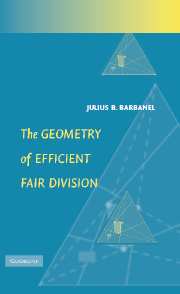Book contents
- Frontmatter
- Contents
- Introduction by Alan D. Taylor
- 1 Notation and Preliminaries
- 2 Geometric Object #1a: The Individual Pieces Set (IPS) for Two Players
- 3 What the IPS Tells Us About Fairness and Efficiency in the Two-Player Context
- 4 The Individual Pieces Set (IPS) and the Full Individual Pieces Set (FIPS) for the General n-Player Context
- 5 What the IPS and the FIPS Tell Us About Fairness and Efficiency in the General n-Player Context
- 6 Characterizing Pareto Optimality: Introduction and Preliminary Ideas
- 7 Characterizing Pareto Optimality I: The IPS and Optimization of Convex Combinations of Measures
- 8 Characterizing Pareto Optimality II: Partition Ratios
- 9 Geometric Object #2: The Radon–Nikodym Set (RNS)
- 10 Characterizing Pareto Optimality III: The RNS, Weller's Construction, and w-Association
- 11 The Shape of the IPS
- 12 The Relationship Between the IPS and the RNS
- 13 Other Issues Involving Weller's Construction, Partition Ratios, and Pareto Optimality
- 14 Strong Pareto Optimality
- 15 Characterizing Pareto Optimality Using Hyperreal Numbers
- 16 Geometric Object #1d: The Multicake Individual Pieces Set (MIPS) Symmetry Restored
- References
- Index
- Symbol and Abbreviations Index
4 - The Individual Pieces Set (IPS) and the Full Individual Pieces Set (FIPS) for the General n-Player Context
Published online by Cambridge University Press: 19 August 2009
- Frontmatter
- Contents
- Introduction by Alan D. Taylor
- 1 Notation and Preliminaries
- 2 Geometric Object #1a: The Individual Pieces Set (IPS) for Two Players
- 3 What the IPS Tells Us About Fairness and Efficiency in the Two-Player Context
- 4 The Individual Pieces Set (IPS) and the Full Individual Pieces Set (FIPS) for the General n-Player Context
- 5 What the IPS and the FIPS Tell Us About Fairness and Efficiency in the General n-Player Context
- 6 Characterizing Pareto Optimality: Introduction and Preliminary Ideas
- 7 Characterizing Pareto Optimality I: The IPS and Optimization of Convex Combinations of Measures
- 8 Characterizing Pareto Optimality II: Partition Ratios
- 9 Geometric Object #2: The Radon–Nikodym Set (RNS)
- 10 Characterizing Pareto Optimality III: The RNS, Weller's Construction, and w-Association
- 11 The Shape of the IPS
- 12 The Relationship Between the IPS and the RNS
- 13 Other Issues Involving Weller's Construction, Partition Ratios, and Pareto Optimality
- 14 Strong Pareto Optimality
- 15 Characterizing Pareto Optimality Using Hyperreal Numbers
- 16 Geometric Object #1d: The Multicake Individual Pieces Set (MIPS) Symmetry Restored
- References
- Index
- Symbol and Abbreviations Index
Summary
In this chapter, we consider the general case of n players. In Section 4A we consider the IPS, and then in Section 4B we shall see that the IPS is not a sufficient structure for studying all fairness properties when there are more than two players. In Section 4C, we generalize the IPS to the FIPS, the Full Individual Pieces Set. In Section 4D, we prove a general result about the possibilities for the FIPS. This result will be a central tool in our work in Chapter 5. We make no general assumptions about absolute continuity in this chapter.
Geometric Object #1b: The IPS for n Players
Before considering fairness and efficiency issues, we consider more general geometric issues, as we did in the two-player context. More specifically, we examine Theorems 2.2, 2.4, and 2.6 and consider appropriate generalizations to the n-player context. The definition of the IPS, of s-equivalence, and of p-equivalence are the obvious generalizations of the corresponding definitions for two players.
Definition 4.1
a. For any partition P = 〈P1, P2, …, Pn〉 of C, let m(P) = (m1(P1), m2(P2), …, mn(Pn)). The Individual Pieces Set, or IPS, is the set {m(P) : P ∈ Part}.
[…]
- Type
- Chapter
- Information
- The Geometry of Efficient Fair Division , pp. 56 - 81Publisher: Cambridge University PressPrint publication year: 2005



